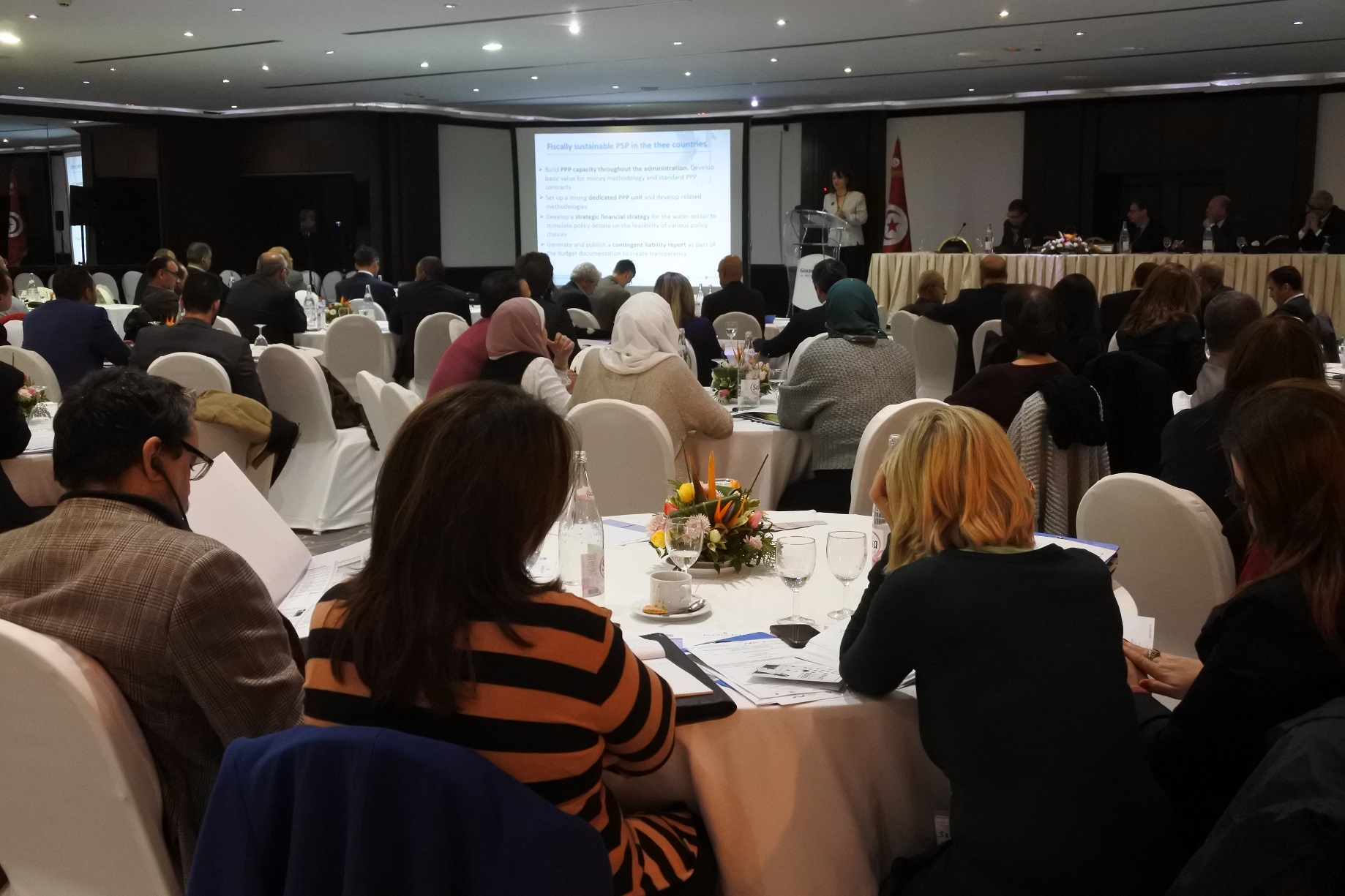The two-day Conference took stock of the outcomes from the Water Policy Dialogues that were conducted in Jordan, Tunisia and Palestine and discussed the way forward and towards a regional compendium of good practices for effective private sector participation and Public-Private Partnerships (PPPs). Furthermore, the Conference capitalised on the ongoing work of the PRPI Group for encouraging bankable projects and investments in the water and environment sectors across the Mediterranean. The ongoing work of other actors in the region was presented and synergies were explored so as to strengthen the impact and outreach of results on sustainable financing of water infrastructure, including through private sector involvement.
Representatives of governments, civil society, financial institutions and other organisations working in the region noted the need for regional cooperation and dialogue among stakeholders as crucial for achieving integrated water resources management, especially in view of the rapid changes taking place across the Mediterranean, and highlighted the importance of good governance for sustainable socio-economic growth, respect for the human right to water and the enabling environment for competitiveness and investments, which should be enhanced through continuous experience sharing and awareness raising. The contribution of the project in this respect was stressed as well as its impact on mainstreaming cross-cutting issues and gender in particular.
The Conference took stock of the developments under the Governance and Finance project and the national Policy Dialogue processes as well as recent reforms in the countries involved stemming also from the Dialogues. Moreover, National Focal Points under MEDPOL presented recent developments under the SAP MED to combat pollution and EIB/MeHSIP representatives gave examples of relevant projects in the region and their socio-economic benefits. Cases of PPPs in the region and the relevant preparation process were presented by representatives from the EIB and the EBRD with an emphasis on the socio-economic benefits of related investments. The first day of the Conference closed with presentations on the social aspects of investments in the water sector including elements of corporate social responsibility (CSR), gender equality in water resources management, the role of civil society institutions and water management-related challenges to rural women in particular.
The second day of the Conference included presentations on the track record and strategy for water investments in the region of International Financing Institutions, the challenges of accreditation and access to the emerging climate finance framework, on the need to create clear linkages across the SDGs as well as synergies between climate mitigation and adaptation.
In the closing session, a summary of the key points raised during the Conference was provided by the organisers. For effective private sector participation (PSP) -which is distinct from privatisation processes- we need efficient regulation, fiscal sustainability and stakeholder involvement. The enabling environment should be designed with consideration to the national and regional contexts and be pro-poor and socially sensitive. Good cases with replicability potential need to be collected and shared, as well as bad practices that need to be avoided. It is important to build stronger linkages between national water strategies and the SDG implementation process. Countries need to capitalise on both existing and emerging financing mechanisms, including the increasing commitments to climate action from financing institutions (including assistance with accessing funding opportunities) and non-conventional sources of financing through microfinancing, the banking sector, insurance companies, etc. To increase the potential for project financing, synergies across financiers (IFIs and donors) need to be maximized, linkages between projects and global targets should be clearly identified, methodologies for identifying priority / flagship projects need to be implemented and policy coherence across the national developmental agenda need to be integrated.
The Conference closed with the institutional partners of the two co-organising initiatives reconfirming their commitment to continue working actively with the countries and at regional level for achieving sustainable financing of water and environmental projects and were complemented by requests from additional countries to be involved in the process.
The proceedings of the Conference are presented in more detail in the Conference Report, available in English and in French.
The Conference formed an integral part of the activities of the Governance & Financing for the Mediterranean Water Sector project, officially labelled under the UfM and jointly implemented by GWP-Med and the OECD. It was organised in close cooperation with the H2020 Pollution Reduction & Prevention Investment Group (PRPI) & National Action Plan process and was supported by the Swedish International Development Agency (Sida) and the European Commission and was conducted in strategic partnership with the European Investment Bank (EIB), the GEF UNEP/MAP MedPartnership programme and the Mediterranean Component of the EU Water Initiative (MED EUWI).
